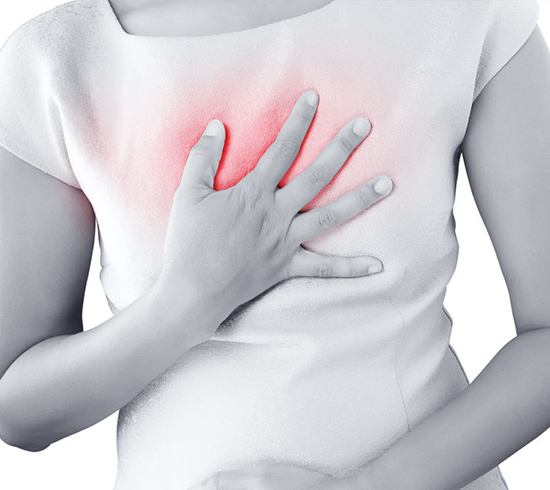

The impact of Food Intolerance over your body
Neurological Symptoms
Depression
Fatigue
Headache
Lack of concentration
Lethargy
Melancholy
Respiratory Symptoms
Asthma
Chronic Cough
Running Nose
Wheezing
Circulatory Symptoms
Edema
Irregular heart beats
Gastrointestinal Symptoms
Abdominal Pain
Heartburn
Bloating/Excessive gas
Constipation
Diarrhoea
Vomiting
Joint Symptoms
Arthralgia (Joint pains)
Muscle pain
Skin Symptoms
Eczema
Hives
Itching
Other Symptoms
Dysmenorrhea
Weight problems
Failure to thrive
Emotional Symptoms
Anxiety
Irritability
Mild depression
Brain fog

Food allergy and food intolerance aren’t same
so lets understand the difference
Often people get confused if their suffering is due to food allergy or food intolerance or food sensitivity so to clear the air,
here are the key differences that’ll help you understand your situation better.
Food Allergy
- Immune reaction towards a specific food protein (allergen)
- Immediate response after consuming the allergen (within minutes)
- Specific IgE dependent
- The response generated isn’t dose dependant as even the minimal allergen exposure can lead to fatal reactions
- Some reactions can be severe and life-threatening
- Allergen/offending food has to be avoided for lifetime
- Allergy tests from serum or skin prick tests are done for diagnosis
- Getting hives eating shellfish or nuts (common allergens), within about 30 minutes of eating that food is a case of food allergy
Food Intolerance
- Digestive system response towards certain foods
- Relatively slower response delayed by hours or days after consuming the causative food
- IgG dependant
- The response generated is dose dependant as the reaction is triggered after consumption in a sufficient amount
- Reactions produced are generally mild and non- life threatening
- Causative food can be consumed after elimination for few days by giving a food trial
- IgG dependent tests like protein microarray and macroarray are done for diagnosis
- Diarrhea from drinking milk, or lactose intolerance is the case of food intolerance
Food Sensitivity
- The immune system “guards” miscommunicate with any type of food or food chemical and send out “poison darts,” or mediators, that cause inflammation until symptoms develop.
- Reactions up to 72 hours after eating and sometimes. hard to pinpoint.
- Mild symptoms of migraine, bloating, digestive pain/issues etc and chronic pain like fibromyalgia or joint aches reflect food sensitivity.


CONSIDER THIS before introducing the elimination diet
- We always encourage you to share your results with your physician
- Be sure to study the food and its nutritional importance before eliminating it from the diet.
- Substitute foods should be introduced to fulfill the lack of nutrition when a particular food is eliminated.
- People with physiologically and medical requirements like pregnant women, young children, geriatric patients should be the most careful while taking up an elimination diet.
- Try to add the foods that are readily available and fresh in season.
- Plan a diet with the foods falling under the normal category. This will help reduce the symptoms in an effective way.
- Based on your prior experience, avoid the foods that have caused a problem even if they fall under the Normal category.
- Do not practice elimination diet in holiday seasons or weddings as this can deprive you of the indulgence and make it difficult to follow the diet.
